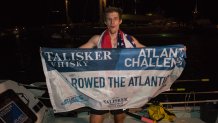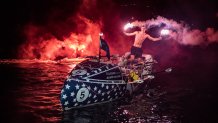What to Know
- Oliver Crane of Princeton, New Jersey, became the youngest person ever to row alone across the Atlantic Ocean on Sunday
- The 19-year-old made it from the Canary Islands to Antigua in 44 days and raised more than $60,000 for two charities
- He plans to attend Princeton University next year and major in political sciences; he said he would also like to row on the crew team
On Dec. 14, 2017, Oliver Crane started rowing. He didn’t stop until he put an entire ocean behind him.
"3,000 miles and you start with a single stroke," he said.
The Princeton, New Jersey, 19-year-old on Sunday became the youngest person ever to row solo across the Atlantic Ocean, topping a 2010 effort by then 22-year-old adventurer Katie Spotz. And his 44-day voyage from the Canary Islands off of Northwestern Africa to the Caribbean isle of Antigua didn’t just earn a record: It has helped Crane raise more than $60,000 for Oceana and a homelessness charity in New Jersey.

Crane, a rower who was taking a gap year between graduation at the Peddie School and freshman year at Princeton University, said he was looking for a big challenge to take on during his time off. And when he read about the Talisker Whisky Atlantic Challenge, an annual transatlantic race that bills itself as “The World’s Toughest Row,” he found something that lived up to his adventurous family's standard -- his mom is an ultra endurance athlete and his siblings have likewise climbed their own figurative and literal mountains.
“We’re not an oceangoing family, so it was all pretty scary,” he said. “But they all got behind me and were really supportive.”
U.S. & World
After four months of training in everything from open-water rowing and navigation to yoga and mindfulness, he was off to San Sebastián de la Gomera to begin the race in the Homeward Bound, a 23-foot ocean rowing boat loaded up with a solar-powered desalinator, radio, navigation systems, 90 days of freeze-dried foods and other essentials including candy and Pringles.
“When I got out there, I had no idea what I was getting into,” he recalled.
Crane said the initial days were perhaps the hardest. He was seasick on a daily basis and having to acclimate to surprisingly rough waters. But it was the loneliness that got him the worst.
“I probably cried every single day,” he said.
His parents, David Crane and Isabella de la Houssaye, said they could tell his distress in those first weeks. Initially, they said they had set expectations to talk via satellite phone once a week, but they changed those plans early on.
“He asked if he could call us every day and it took one-tenth of a second for us to say ‘Yes,’” his father said.
Then there were the swells. Crane said he was met with monster waves like ones he assumed were only possible through computer-generated effects in movies like “The Life of Pi.” His boat capsized a half-dozen times taking on the rough seas, including one that left him under water with his feet still strapped into his rowing foot stretcher.
“It was like a water bucket dumped on me and suddenly upside down in the row position,” he said. “I was tied really tightly and struggled to get out. I was kicking under water and managed to get loose, but it was really terrifying.”
His parents said they also had their own worries during the race. Seven days in, rowers in a pair of other boats had to be rescued after one of their vessels caught fire and another sank during a particularly bad storm.
“It was scary to know your son was in a situation where other boats were sinking,” said de la Houssaye.
But the 19-year-old’s voyage certainly had some exhilarating high-water marks. On Christmas, a yacht sailed up next to his boat -- which had been decked out with lights for the occasion -- and its inhabitants sang him carols as he unwrapped gifts his parents had packed for him.
“In my mind it was truly a miracle,” he said. “It became one of my favorite Christmases ever.”
And certainly, he’ll never forget the finish. He said he always knew he’d make it to Antigua, but it didn’t stop him from letting out whoops of joy and lighting flares as he pulled in to port to be reunited with his family and friends.
“I’ve never felt such joy and happiness,” he said.

When he arrived in Antigua, Crane found out he had set another record for greatest weight loss during the voyage, losing 25 pounds and going from 8 percent to 4 percent body fat over the course of the race.
He chalked a lot of that weight loss up to not being able to eat in the early days -- and not wanting to take breaks to munch of freeze-dried 1,000-calorie bars later on (his first meal back on dry land was a cheeseburger, fries and a Coca-Cola.)
Now, Crane said he’s setting his sights on getting ready for his first year at Princeton and says he plans to major in political science. He said he also plans to try out for the Tigers’ lightweight rowing team.
“I think I’ll go back to river rowing,” he said. “I never called it river rowing before now.”



